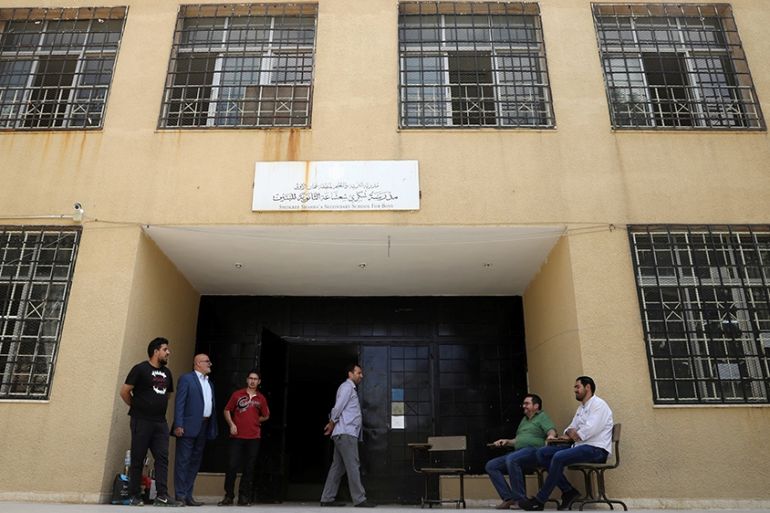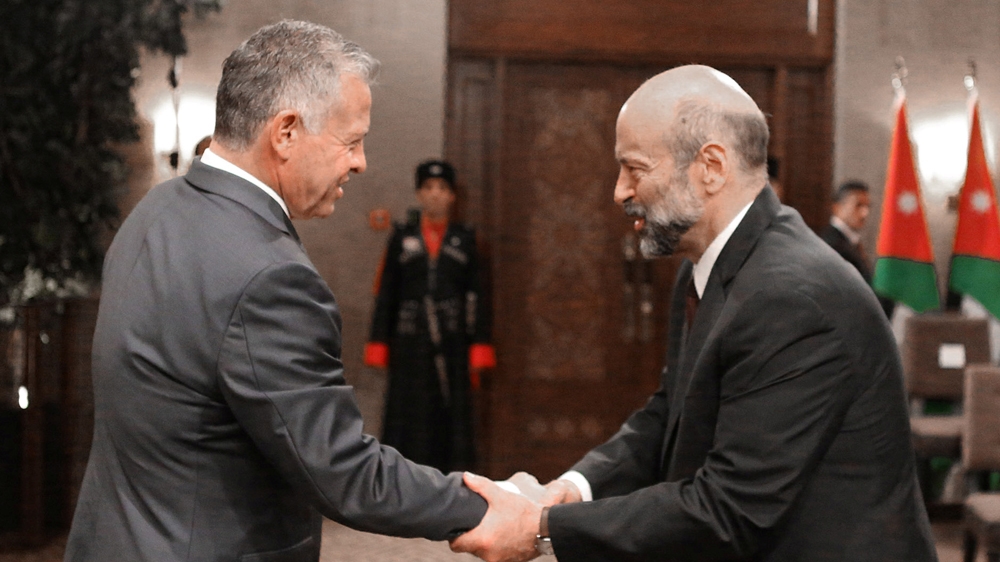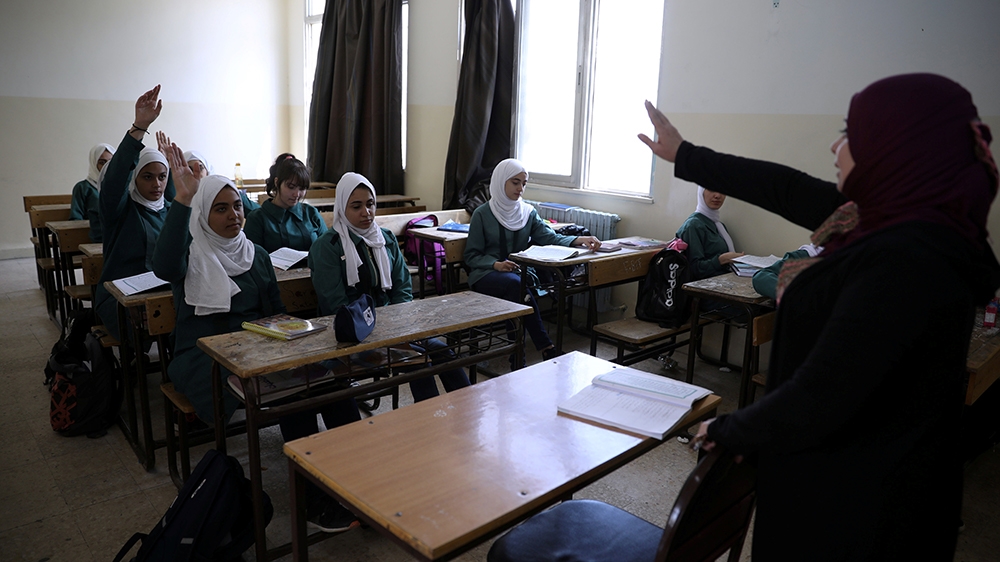Teachers on strike in Jordan demand higher income, ‘dignity’
Tired of doing extra jobs to supplement low income, teachers cite lack of respect from government and society.

Amman, Jordan – In a public secondary school in central Amman, a maths teacher moonlights as a delivery driver outside his schoolroom hours to supplement his income. An Arabic teacher works in a grocery shop. Others drive taxis or give private tuition on the side.
In short, most teachers in the school have a second or even third job in the informal sector.
Keep reading
list of 4 itemsColumbia University leaders face scrutiny over anti-Semitism on campus
Top USC graduate cancelled over Gaza speaks out
Columbia president faces anti-Semitism Congress hearing: What’s at stake?
“I make deliveries to earn some extra money,” the maths teacher, who spoke to Al Jazeera on condition of anonymity. “I have been teaching for 10 years but I only earn 420 Jordanian dinars ($592) a month. Our salaries are among the lowest in the public sector.”
Since September 8, most of Jordan’s 87,000 public school teachers have been on strike to demand a 50 percent salary increase.
The protest entered its third week after negotiations held between the teachers’ union and the government failed to reach a resolution.
At 10am on a working day in the school, there are no students in the classroom. The teachers are still coming to school during their regular working hours, but refusing to teach.
We are helping to build this country. But teachers receive no appreciation. Not from the government and not from society.
Sitting at their students’ desks, they gather in one of the classrooms and discuss the strike. All of them requested anonymity. Al Jazeera is therefore also not identifying the school.
“I can’t get married because the salary is so low,” said a 30-year-old geography teacher, who still lives with his family.
He has been teaching for seven years and earns 400 dinars ($565) a month.
“I have a wife and three kids. I teach private classes on the side to be able to support my family,” adds a maths teacher.
Jordan’s department of statistics has set the absolute poverty line at 340 dinars ($479) a month for a family of five.
The Jordanian Teachers’ Association (JTA) is demanding the government honour a 50 percent salary increase promised to teachers five years ago.
Government officials estimate that the pay rise would cost $158m, which they say is not available in the state budget.

Jordan has been facing a dire economic situation for years.
In June 2018, a general strike and protests over tax rise that were part of International Monetary Fund (IMF)-driven austerity measures led to the resignation of Jordan’s prime minister.
King Abdullah II replaced him with Omar Razzaz, a former World Bank official and education minister.
With high inflation, prices in Jordan have soared but incomes have stagnated. Jordanian teachers say what they earn is not enough to cover basic expenses.
“The main reason why I joined the strike was the low salary,” explains the maths teacher.
But the geography teacher sitting next to him says it is also a protest for dignity.
“Teachers are not respected in Jordan,” he says.
On September 5, tens of thousands of teachers protested in Amman to demand higher salaries. Prevented from marching towards government headquarters by security forces, some protesters scuffled with security forces.
The teachers’ union accused the police of humiliating teachers and using excessive force.
Local media reported tear gas was used to disperse the crowd and at least 50 teachers were arrested and later released. Security forces have denied the accusations, saying that police were restrained.
On video statements published on JDA’s Facebook page, the union’s deputy head Naser al-Nawasrah said that in addition to the salary increase, teachers are demanding that those responsible for alleged abuse during the rally are held accountable – calling for an apology from the government. The union has decided to continue the strike until these demands are met.
An English teacher working in a primary school for girls in east Amman says she loves her job despite the poor working conditions, but believes that teachers are looked down upon.
“We are helping to build this country,” she says. “But teachers receive no appreciation. Not from the government and not from society.”
Over a million students without classes
Because of the strike, some 1.3 million public school students have not attended classes for the past three weeks.
Outside a secondary school for girls in east Amman, three friends in their last year of secondary school sit on a bench. Since all of them want to go to university, they are concerned about falling behind in their studies.
“My parents are very worried, they are thinking about moving me to a private school,” says Hala*. “My family can afford a private school, but a lot of other people cannot.”
Secondary school students must pass a final exam with a good mark to access higher education in Jordan.
Some private schools in Amman have started taking in final year students and education centres are offering additional classes.
The three friends are taking private classes at different educational centres.
“We are falling behind in all the subjects, but we don’t blame our teachers,” says Laila*. “We know they earn so little. We want them to win this fight.”

But not everyone in Jordan is supportive. Some parents have submitted legal complaints against teachers for depriving children of their right to education. Others have expressed concerns about the effect of missing three weeks of school.
“Parents are fed up, the kids are staying at home doing nothing. They are staying up late and it’s hard to convince them to go back to their daily routines,” says Nisreen Hourani, the mother of a 16-year-old girl.
Hourani registered her daughter in two educational centres to make up for some of the classes she has missed in the past three weeks. She pays $10 for each class, and says some of her friends cannot afford this luxury.
“Most of us receive low salaries,” says Hourani, who earns 300 dinars ($423) for her work as an administrator, saying a broad range of groups struggle with the high cost of living in the country.

But according to Ahmad Awad, director of Jordan Labor Watch and an advocate for labour rights, teachers have been neglected by the government and their demands are “the minimum they could ask for”.
He says negotiations have been complicated by government fears that giving in to the teachers’ demands would motivate other unions to pursue similar action.
“Another reason is negotiations with the IMF, which asked the government to reduce spending on the public sector. Austerity increased pressure on public salaries,” adds Awad.
Since 1989, IMF interventions in Jordan tried to cut government expenditures through privatisations, new taxes and scrapping subsidies.
Despite protests last year against austerity policies backed by the IMF to tackle Jordan’s huge debt, the Jordanian government continued pushing for higher taxes and measure to decrease public spending.
“Neoliberal policies in the last 30 years have put a lot of pressure on the public sector,” says Awad. But for some teachers, the strike is about more than economic deprivation and stagnant salaries.
“The main reason I joined the strike was the lack of respect from the government,” says the maths teacher who also works as a deliveryman. “For me, this is more important than the bad salary.”